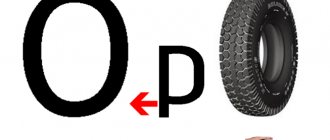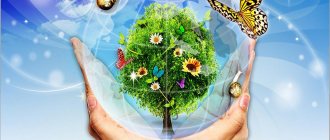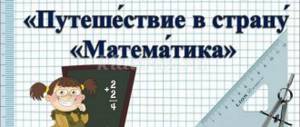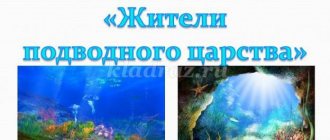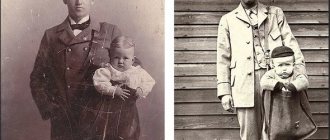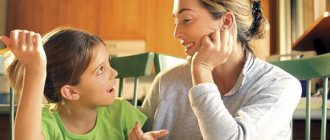Presentation “Visiting the Minister of Ecology”; 1-4 grade
Native nature is a powerful source from which a child draws many knowledge and impressions.
Interest in surrounding objects of inanimate and especially living nature appears very early. Children notice everything: a hardworking ant on a forest path, a moving bug on the mirror-like surface of water, a tiny spider in the thick grass. Children's attention is attracted by seasonal changes in nature, the brightness of colors, the variety of sounds and smells. They discover a new world for themselves: they try to touch everything with their hands, look at it, smell it, if possible, taste it. While maintaining a child’s sincere interest in the environment, one should remember to foster a caring attitude towards nature. It is very important that adults themselves love nature and try to instill this love in children. We are born by nature, and man will never lose touch with it. But you need to have patience, you need to have an attentive eye and a sensitive soul to see the quiet beauty of a tiny wildflower or the play of colors during sunset, the lush bloom of lilacs, or listen to the ringing singing of birds.
Nature is a great teacher!
When it comes to the technology of educating primary schoolchildren, then, of course, I turn first of all to the game.
Ask the children: “Why do you like to play?” They will answer: “It’s interesting to play”; "like"; "I want to"; “It’s fun to play!” etc. And that’s why, for us teachers, playing with children is important!
“The game is a serious matter.” Play in the educational process is life itself, a figurative model of life situations, a projection onto the natural process of a child’s life. While playing, the child gains a variety of experiences interacting with the world around him; while playing, he performs very specific environmental work; while playing, he learns the rules of behavior in the environment; while playing, he becomes kind, sensitive, and responsive to the misfortune of others.
The game enriches the child’s personal experience with examples of positive interaction with the environment. This is extremely important in the modern situation, which provides the child with an endless number of negative examples.
The game is interesting, exciting, the game is rich in images and clarity that remain in children's memory.
Goal: generalize and deepen students’ environmental knowledge. Objectives: To develop environmental consciousness and a sense of respect for planet Earth; Develop interest, respect and love for the surrounding world; Promote the development of thinking, attention, observation; Bring a feeling of joy, create a festive mood.
Equipment: projector, screen, laptop, set of letters (l, e, i, t, s, b, o) world map.
Progress of the event:
Guys, look at this picture, see how not bright it is. Would you like to live in a world where the sun disappeared, there were no flowers, and everything became black and white? Today I invite you to take a trip to the Minister of Environment, who will help us make this picture bright.
Who do you think the Minister of Environment is? Now you will perform certain tasks, and if the tasks are completed correctly, then the picture will become bright in parts and butterflies, fish, the sun, and birds will appear in it. Are you ready to bring the picture to life? Then be careful when completing tasks. The first task for you is warm-up. We listen to the question and give the correct answer. For your activity you will receive tokens. At the end of the game, whoever collects the most tokens will receive a prize.
Quiz: (slide 2)
I will now read out the questions, be careful.
We don’t shout out answers, but raise our hands. What predatory animal loves raspberries very much? Bear The name of which plant is associated with ringing? (Bell.) Which tree is shaking? (Aspen.) Who is stronger: a lion or a tiger? (Tiger.) Where is the grasshopper's ear? (On the leg.) How many legs does a spider have? (Eight.) Who has eyes on his horns and a house on his back? (Snail.) Which snow melts faster - clean or dirty? (Dirty.) Who do they say swam in a pond but remained dry? (Goose, duck.) Small, gray, delicacy for cats. (Mouse) Red-haired, cunning and lives in the forest. (Fox) Gray coward. (Hare) Groom of the chicken. (Rooster) 2. The water space of the planet.
(slide 3) Click on the black and white background to display an image of a world map. Of course, you guys know very well how important water is on Earth. Without it there would be no life on our planet. Look at the world map to see how much area of our planet is occupied by water in the form of rivers, oceans, seas, and lakes. What rivers, lakes, seas do you know? We will hold an auction of rivers, lakes, seas, and oceans. The last one to say the name wins. At the end of the game, click on the map with the mouse and slide 3 will appear.
The fourth one is extra! (slide 4)
We move the cursor over the gray background, click, and the slides with pictures begin to scroll through. When flipping through the slides, on each one, after the children answer correctly, we click on the background of the slide. Each image of the correct answer has a trigger attached to it. After the discussion, click on the arrows and move on to the next slide.
There are 4 images on the screen in front of you, three of which can be combined into one group according to some common characteristic. Thus, it is necessary to note the extra picture among them, and explain why it is extra. Whoever gives the correct answer first and explains why he made such a choice will receive a token.
Mushrooms: porcini, boletus, boletus (edible), fly agaric (poisonous) Trees: birch, aspen, willow, (deciduous), pine (coniferous) Animals: fox, hare, wolf, bear (hibernates, does not change its fur coat for the winter ) Berries: lingonberries, blueberries, cranberries (grow in the forest), strawberries (grow in the garden) Insects: butterfly, mosquito, bumblebee (fly), frog (jumping)
On the slide with berries, click on the background and go to slide 4.
Forest expedition. (slide 5)
You all love to relax in the forest, with your parents and friends. But guys, we come to the forest to visit and in order to be polite guests, we should not violate the rules of conduct in the forest. Now we’ll check to see if you know what we can take with us into the forest, so that there we can use it for its intended purpose, and not just carry extra weight. I’m going to read a verse to you now, if you agree with me that you should take it on a picnic, then clap, if you don’t agree, then stomp. You choose only what we need for the picnic. We are going to the forest for a picnic. How should we behave here? If our picnic is good, then clap your hands. If you don't agree with us, then stomp your feet. We collected our backpacks... (Clapping.) Put down the pots... (Clapping.) Sleeping bags and mugs... (Clapping.) Souvenirs and toys... (Stomping.) Bread, canned food and drinks... (Clapping.) Carnival capes... (Stomping.) Sleighs , stick and skates... (Stomping.) And garlands - lights... (Stomping.) Closer to midnight they gathered... (Stomping.) On the way we shouted songs... (Clapping.) And came to our clearing... (Clapping.) They cleared away the garbage there - bottles... (Clapping.) They settled down well... (Clapping.) They decided to make a fire... (Clapping.) They felled five birch trees... (Clapping.) And half the forest was set on fire... (Clapping.) And then they poured water... (Clapping.) And They put out the entire fire... (Clapping.) They caught their breath, smiled... (Clapping.) And they returned home again... (Clapping.) They stomped along the road... (Clapping.) And they clapped again! (Applause.)
Relay of letters. (slide 6)
In this competition you are asked to solve riddles. But you will not speak and shout the answers, but put them together from letters. I will give you a set of letters from which you will form the answer.
It cheers in the spring, cools in the summer, nourishes in the fall, warms in the winter. (forest)
What's in the same shirt in summer and winter? (spruce)
Touching the grass with his hooves, a handsome man walks through the forest, walking boldly and easily, with his horns spread wide. (elk)
Sits - turns green, Flies - turns yellow, Falls - turns black. (sheet)
Ecological traffic light. (slide 7)
The images will now be shown to you.
You will tell children whether they are doing well or bad, and explaining why. Be careful. Click on the black and white background to start showing images of children's behavior in nature. After each discussion, scroll through the slides, up to 19. On the slide with a picture with the number 19, click on this number with the mouse, slide 7 will appear. Literary heroes.
(slide Many animals are found in fairy tales as literary heroes, and often play the main role in the work. Now I will tell you the names of animals, and what animal did you call me that. For example: Tsokotukha - fly. Ryaba - chicken Robber - nightingale Shushara - rat Tortila - turtle Eeyore - donkey Piglet - pig Matroskin, Basilio, Leopold - cat Alice - fox Winnie - Pooh - little bear Gena - crocodile Baloo - bear
Who lives where (slide 9)
Chickens sleep in the chicken coop, ants in the anthill. Let's continue the game! Pigs - in the pigsty Dogs - in the kennel Horses - in the stable Cows - in the barn Bees - in the hive Bears - in the den Foxes - in the hole
A squirrel has a little squirrel, a mouse has a little mouse, a cuckoo has a little cuckoo. Let's continue the game. But be careful! The crow has a little raven The jackdaw has a little crow The goat has a baby goat The fox has a baby fox The frog has a baby frog The hen has a chick The cow has a calf The horse has a foal The pig has a piglet The dog has a puppy The sheep has a lamb The pike has a little pike.
Poultry yard. (slide 10)
One day Grandfather Yegor came into the poultry yard and saw many birds. You, friend, marvel too. If suddenly you see not a bird, but an animal, then clap your hands loudly, both boy and girl! Here in the poultry yard, a dog lives in a kennel... Guards a turkey... And a handsome rooster... A singing nightingale... And a mighty horse... A fluffy kitty... A vocal pig... A laying hen... A gray cuckoo... A frog from the swamp... A baby foal... A long-legged ostrich... A tailed peacock ... A long-nosed stork... A big-headed eagle owl... A long-eared elephant... And a terrible dragon. Grandfather Yegor got scared and left the poultry yard. And from then on, grandfather Yegor never set foot in the poultry yard. We will come here again and have a wonderful time!
Forest inhabitants. (slide 11)
Guys, look carefully and tell me what else is missing to make the picture come to life? That's right, of course, we lack the inhabitants of the forest, these are bugs, spiders, butterflies, grasshoppers, insects, which bring great benefits to the forest. Everything lives in motion! Who is flying and who is walking must be shown with a gesture! I will help you. (Shows movements.) Whoever flies, wave your hand! Mark the one who swims with a wave! Who just walks - clap! Who crawls - stomp! Don't forget to move, be careful! Children, listening to poetry, perform movements. A heavy Colorado potato beetle... A candidate of medical sciences... A fast-swift seahorse... A buzzing swarm of bees... A beautiful white moth... A fluffy little ferret... A long earthworm... A potbellied little hamster... An airy white jellyfish... A poet's or composer's muse... A green, bug-eyed dragonfly... Giving milk a goat... A mustachioed red cockroach... A large lizard - a monitor lizard... Like soot, a black jackdaw... A beautiful mermaid... A spotted, nimble snake... He, she, you and me... A winged bird ostrich... Father Frost or Santa Claus...
At the end of the game, slide 12 is shown.
Guys, I understand everything!
We do not need to look for a Minister, because it depends on us what life will be like today, tomorrow and in all subsequent years. We hope that everyone present at this holiday today has made the right conclusion for themselves and wherever you are, please remember your responsibility for the fate of nature. And she will thank you for taking care of herself with her gifts. Let's sum it up, count the tokens. Who was the most active at the event today? Full text of the material Presentation “Visiting the Minister of Ecology”;
For grades 1-4, see the downloadable file . The page contains a fragment.
| Author: Simonova Lyubov Nikolaevna → Evgeny 06/08/2011 9 54428 8622 | Comment |
Thank you for your mark. If you want your name to be known to the author, log in to the site as a user and click Thank you again. Your name will appear on this page.
Login | Registration
Have an opinion? Leave a comment
Presentations on ecology
Create your teacher website PC and PPC courses Video lessons Olympiad Webinars for teachers
- home
- Ecology
- Presentations
Watch and download free lessons, tests, notes, presentations and other useful materials on ecology for teachers and students. In this section you can get presentations on ecology .
- All 359
- Lessons 61
- Presentations 65
- Tests 11
- Planning 19
- Events 67
- Other 136
- All classes
- For preschoolers
- 1 class
- 2nd grade
- 3rd grade
- 4th grade
- 5th grade
- 6th grade
- 7th grade
- 8th grade
- 9th grade
- Grade 10
- Grade 11
Presentation on the topic: “The language of animals” This development can be used as additional material for an ecology lesson on the topic “Features of human food and information connections”…. 09.22.2020 Golubeva Natalya Alexandrovna 71 1 |
| Research work “Environmental problem of the school neighborhood” Study of the problems of garbage pollution in our neighborhood…. 09/05/2020 Kuznetsova Svetlana Vladimirovna 78 1 |
| “Presentation for the Ecological and Local Lore Guide” The presentation is intended to present the “Ecological and Local Lore Guide”... 09/11/2020 Dolmatova Svetlana Valentinovna 66 0 |
| “Ecological and local history guide to the territory of the Vasilkovsky rural settlement and its surroundings” Presentation for the presentation of the “Ecological and local history guide”… 09/11/2020 Dolmatova Svetlana Valentinovna 291 0 |
| Groups of organisms in a natural community Groups of organisms in a natural community. Producers, consumers, decomposers. Power circuit... 05.27.2020 Lyudmila Filipova 119 1 |
Quiz “excursion into the world of vegetables” for the lesson “vegetable crops” Purpose and objectives: to organize the activities of students to study the diversity of vegetable crops and introduce them to the classification of vegetables…. 02/18/2020 Makarova Nina Yurievna 110 1 |
| LPZ “Descriptions of human housing” • Topic: Description of human housing as an artificial ecosystem • Purpose: Find out whether the apartment is an ecosystem; what distinguishes it from the natural ecosystem; What is included in the concept of “environmentally friendly... 06/02/2020 Burkal Ekaterina Valentinovna 148 0 |
| Project "Leave Your Mark" Show the relevance of the project topic. that environmental problems can be partially reduced if a responsible attitude towards the environment is formed from childhood... 05/20/2020 Borovik Olga Petrovna 124 1 |
| Urban environment Slide No. 1. Topic: Urban environment. Solid household waste, there is a solution to the problem in the city. Slide number 2. Plan: why waste generation in cities remains a problem in... 04/29/2020 Vinogradova Elena Veniaminovna 130 3 |
| Presentation on the topic: “The most beautiful natural reserves in Russia” Additional material for the lesson topic “Specially protected areas”…. 05/14/2020 Golubeva Natalya Alexandrovna 131 1 |
| Quiz “excursion to the world of berries” for the lesson “berry crops” Purpose and objectives: to clarify children’s knowledge about berries, to develop children’s creative abilities, activity, intelligence and speech; expand knowledge about nature; evoke positive emotions... 02/18/2020 Makarova Nina Yurievna 124 2 |
| “What to do if a light bulb breaks?” The article talks about mercury, its benefits and possible harm. An action plan is also outlined in the event of failure of an ESL containing mercury... 01/17/2020 Asmandirov Alexander Denisovich 122 1 |
| Ekologik madaniyat. Ekologik madaniyat.Ekologiya haqida tushunchalari…. 04/10/2020 Jo'rayev Qudratbek Abduqaxorovich 184 0 |
Analysis of the water of local reservoirs and ways to solve environmental problems of water sources Study of the ecological state of the sources of the Aigurka River and the water area of the pond located on the territory of the village of Malye... 12/10/2019 Olga Trofimovna Dubovik 159 1 |
| Presentation for an open lesson on ecology “Sleep and Dreams” Presentation for an open lesson on ecology “Sleep and Dreams”… 12/06/2019 Shchekoturova Yulia Sergeevna 179 1 |
| “Analysis of the water of local reservoirs and ways to solve environmental problems of water sources” Study of the ecological state of the sources of the Aigurka River and the water area of the pond located in the village of Malye Yagury 12/10/2019 Dubovik Olga Trofimovna 166 3 |
| Environmental education of schoolchildren. “Forest Pharmacy” All about the benefits of forest trees... 12/02/2019 Minenkova Elena Andreevna 161 2 |
| Analysis of the water of local reservoirs and ways to solve environmental problems of water sources Study of the ecological state of the sources of the Aigurka River and the water area of the pond located on the territory of the village of Malye... 12/10/2019 Olga Trofimovna Dubovik 188 1 |
| Presentation “Environmental education at school”, environmental events at school, competitions, kvn…. 12/11/2019 Ustimova Elena Vladimirovna 248 3 |
| Presentation for the lesson Ecological groups of plants in relation to water The goal of this presentation is to introduce students to the ecological groups of plants and learn to distinguish between these groups... 01/07/2020 Dikun Vera Vyacheslavovna 451 13 |
- ← Back
- Continue →
